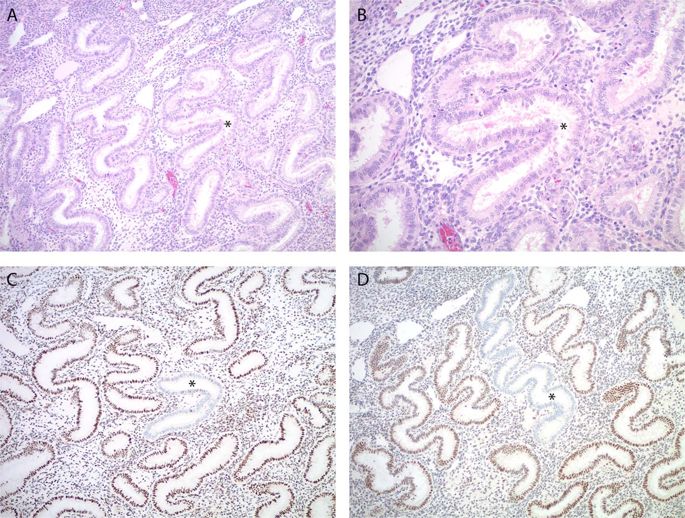当前位置:
X-MOL 学术
›
Modern Pathol.
›
论文详情
Our official English website, www.x-mol.net, welcomes your
feedback! (Note: you will need to create a separate account there.)
Frequent loss of mutation-specific mismatch repair protein expression in nonneoplastic endometrium of Lynch syndrome patients.
Modern Pathology ( IF 7.1 ) Pub Date : 2020-01-13 , DOI: 10.1038/s41379-020-0455-x Serena Wong 1 , Pei Hui 1 , Natalia Buza 1
Modern Pathology ( IF 7.1 ) Pub Date : 2020-01-13 , DOI: 10.1038/s41379-020-0455-x Serena Wong 1 , Pei Hui 1 , Natalia Buza 1
Affiliation

|
Lynch syndrome is most often caused by a germline mutation in one of four DNA mismatch repair (MMR) genes (MLH1, PMS2, MSH2, or MSH6) or EPCAM and is associated with a significantly increased risk of endometrial cancer in affected women. Although universal screening of endometrial cancer for Lynch syndrome is becoming increasingly common by various algorithms using MMR immunohistochemistry and/or microsatellite instability testing by PCR, establishing the diagnosis of Lynch syndrome can be still challenging. MMR-deficient nonneoplastic colonic crypts have been recently described in Lynch syndrome patients with colorectal carcinoma, and have been proposed to be a novel indicator of Lynch syndrome. Presence of MMR-deficient nonneoplastic endometrial glands have not yet been systematically evaluated in Lynch syndrome patients. We performed MMR protein immunohistochemistry in prophylactic hysterectomies and endometrial curettings/biopsies from 27 patients with known Lynch syndrome confirmed by germline mutation analysis. A total of 56 control benign endometrial tissues were also analyzed, and included benign endometrium adjacent to MMR-deficient sporadic (MLH1 promoter hypermethylated) endometrial carcinoma (n = 9), adjacent to MMR-intact sporadic endometrial carcinoma (n = 27), and normal endometrium from hysterectomies performed for benign disease (n = 20). MMR protein deficient nonneoplastic endometrial glands were identified in 70% (19 of 27) of Lynch syndrome patients. In all 19 cases the MMR protein loss was specific for the patients' known germline mutation. None of the control cases showed loss of MMR protein expression in nonneoplastic endometrium. Our findings suggest that MMR-deficient nonneoplastic endometrial glands may be a unique, specific marker of Lynch syndrome, and may provide an important insight into the pathogenesis of Lynch syndrome-associated endometrial cancer. Evaluation of MMR protein expression of benign background endometrium in endometrial cancer patients may be further explored as a possible useful addition to the Lynch syndrome screening algorithm.
中文翻译:

林奇综合征患者非肿瘤性子宫内膜突变特异性错配修复蛋白表达的频繁缺失。
Lynch 综合征最常由四种 DNA 错配修复 (MMR) 基因(MLH1、PMS2、MSH2 或 MSH6)或 EPCAM 之一的种系突变引起,并与受影响女性患子宫内膜癌的风险显着增加有关。尽管通过使用 MMR 免疫组织化学和/或通过 PCR 进行微卫星不稳定性测试的各种算法对 Lynch 综合征进行子宫内膜癌的普遍筛查变得越来越普遍,但确定 Lynch 综合征的诊断仍然具有挑战性。最近在患有结直肠癌的 Lynch 综合征患者中描述了 MMR 缺陷的非肿瘤性结肠隐窝,并被提议作为 Lynch 综合征的新指标。尚未在 Lynch 综合征患者中系统地评估 MMR 缺陷的非肿瘤性子宫内膜腺体的存在。我们对 27 名已知 Lynch 综合征患者的预防性子宫切除术和子宫内膜刮除术/活组织检查进行了 MMR 蛋白免疫组织化学分析,这些患者已通过种系突变分析得到证实。还分析了总共 56 个对照良性子宫内膜组织,包括与 MMR 缺陷散发性(MLH1 启动子高甲基化)子宫内膜癌相邻的良性子宫内膜(n = 9),与 MMR 完整散发性子宫内膜癌相邻(n = 27),以及来自良性疾病子宫切除术的正常子宫内膜 (n = 20)。在 70%(27 人中的 19 人)的 Lynch 综合征患者中发现了 MMR 蛋白缺陷的非肿瘤性子宫内膜腺体。在所有 19 例中,MMR 蛋白丢失对患者已知的种系突变具有特异性。对照病例均未显示非肿瘤性子宫内膜中 MMR 蛋白表达的丧失。我们的研究结果表明,MMR 缺陷的非肿瘤性子宫内膜腺体可能是 Lynch 综合征的独特特异性标志物,并且可能为 Lynch 综合征相关子宫内膜癌的发病机制提供重要的见解。可以进一步探索评估子宫内膜癌患者良性背景子宫内膜的 MMR 蛋白表达,作为林奇综合征筛查算法的可能有用补充。
更新日期:2020-01-14
中文翻译:

林奇综合征患者非肿瘤性子宫内膜突变特异性错配修复蛋白表达的频繁缺失。
Lynch 综合征最常由四种 DNA 错配修复 (MMR) 基因(MLH1、PMS2、MSH2 或 MSH6)或 EPCAM 之一的种系突变引起,并与受影响女性患子宫内膜癌的风险显着增加有关。尽管通过使用 MMR 免疫组织化学和/或通过 PCR 进行微卫星不稳定性测试的各种算法对 Lynch 综合征进行子宫内膜癌的普遍筛查变得越来越普遍,但确定 Lynch 综合征的诊断仍然具有挑战性。最近在患有结直肠癌的 Lynch 综合征患者中描述了 MMR 缺陷的非肿瘤性结肠隐窝,并被提议作为 Lynch 综合征的新指标。尚未在 Lynch 综合征患者中系统地评估 MMR 缺陷的非肿瘤性子宫内膜腺体的存在。我们对 27 名已知 Lynch 综合征患者的预防性子宫切除术和子宫内膜刮除术/活组织检查进行了 MMR 蛋白免疫组织化学分析,这些患者已通过种系突变分析得到证实。还分析了总共 56 个对照良性子宫内膜组织,包括与 MMR 缺陷散发性(MLH1 启动子高甲基化)子宫内膜癌相邻的良性子宫内膜(n = 9),与 MMR 完整散发性子宫内膜癌相邻(n = 27),以及来自良性疾病子宫切除术的正常子宫内膜 (n = 20)。在 70%(27 人中的 19 人)的 Lynch 综合征患者中发现了 MMR 蛋白缺陷的非肿瘤性子宫内膜腺体。在所有 19 例中,MMR 蛋白丢失对患者已知的种系突变具有特异性。对照病例均未显示非肿瘤性子宫内膜中 MMR 蛋白表达的丧失。我们的研究结果表明,MMR 缺陷的非肿瘤性子宫内膜腺体可能是 Lynch 综合征的独特特异性标志物,并且可能为 Lynch 综合征相关子宫内膜癌的发病机制提供重要的见解。可以进一步探索评估子宫内膜癌患者良性背景子宫内膜的 MMR 蛋白表达,作为林奇综合征筛查算法的可能有用补充。











































 京公网安备 11010802027423号
京公网安备 11010802027423号